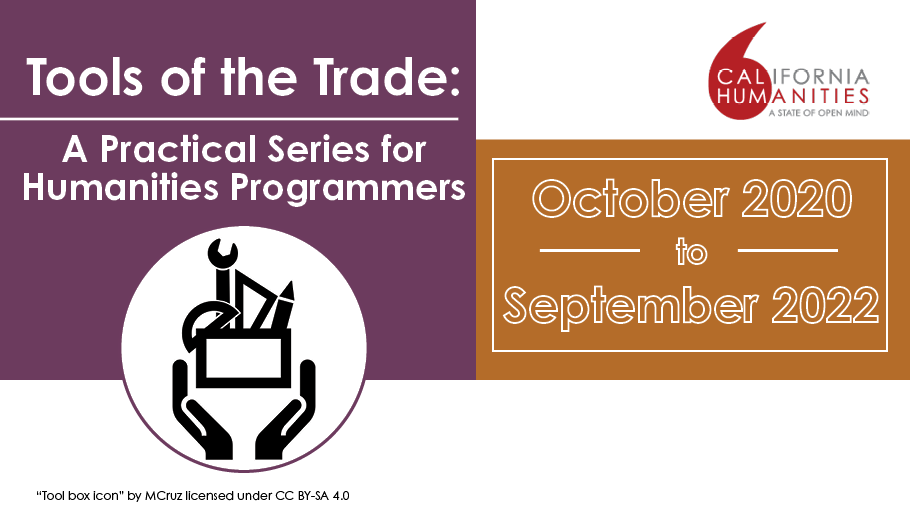
Tools of the Trade: A Practical Series for Humanities Programmers
To support the public humanities field and promote its recovery from the impacts of the COVID-19 pandemic, California Humanities organized and delivered a series of free online learning sessions in 2020-2022. Aiming to build and rebuild the capacity of individuals and organizations to provide relevant, responsive, and engaging humanities programs, Tools of the Trade enabled California Humanities’ grantees and partners to share their innovative and creative work with others in the field.
Each of the six sessions featured short presentations by programmers working in various settings – museums, libraries, community-based nonprofits, and educational institutions — who shared lessons learned from their own experiences about a range of topics: effective modes of online and physically distanced programming; reaching new and underserved audiences; providing welcoming and inclusive experiences for people with disabilities; and gaining greater visibility and recognition. Discussions among the participants were moderated by humanities experts and driven by comments and questions posed by attendees to provide opportunities for anyone interested in the public humanities field, wherever they might be situated, to share their insights and hear from others.
Recordings of each session, along with other resources, are available to anyone interested in learning more about these topics. We hope that you, too will find inspiration and valuable information by watching these, available below.
Tools of the Trade was produced by Felicia Kelley, Project and Evaluation Director, and Kirsten Vega, Associate Program Officer, with support from other California Humanities staff members, board members, and grantees and partners.
Partners
Tools of the Trade is made possible by the National Endowment for
the Humanities (NEH) as part of the American Rescue Plan (ARP)
and the NEH Sustaining the Humanities through the American
Rescue Plan (SHARP) initiative.

Tools of the Trade Experiences

Tools of the Trade: Increasing Your Visibility
Explore ways to raise the visibility and impact of public humanities programs, through a conversation California Humanities grantees. Hear stories from project directors who have recently garnered new relationships with the media and elected officials.
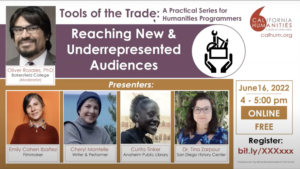
Tools of the Trade: Reaching New & Underrepresented Audiences
Learn how recent California Humanities grantees are successfully engaging their new and returning audiences with humanities programs. Hear their takeaways from experimenting with a range of outreach and engagement strategies.

Tools of the Trade: All Welcome! Best Practices for Increasing Accessibility
Explore how we can make public humanities programs more accessible to people of all abilities, through a conversation with the team from The Art of Disability Culture, an exhibit and public program series organized by the Palo Alto Arts Center.
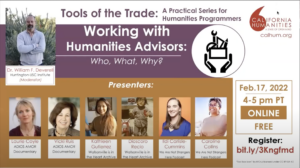
Tools of the Trade: Working with Humanities Advisors: Who, What, Why
Many California Humanities grants require or encourage involvement of a humanities advisor. How does the involvement of a humanities advisor benefit a project? What makes for effective collaboration? Hear three pairs of project directors and humanities advisors share their experiences.
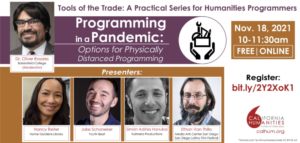
Tools of the Trade: Programming in a Pandemic: Options for Physically Distanced Programming
Learn how recent California Humanities grantees Youth Beat, SPACES: Oakland, Home Gardens Library, and Little Saigon Mobile Museum are successfully engaging their audiences with physically distanced humanities programs. Hear their takeaways from experimenting with a range of in-person formats beyond the virtual realm.
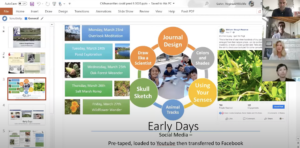
Tools of the Trade: Virtual Programs, Real Conversations
Recent California Humanities grantees The World According to Sound, Inlandia Institute, Elkhorn Slough, SDFutures Collective, and Oakland Asian Cultural Center share strategies to engage new audiences with online humanities programs.
